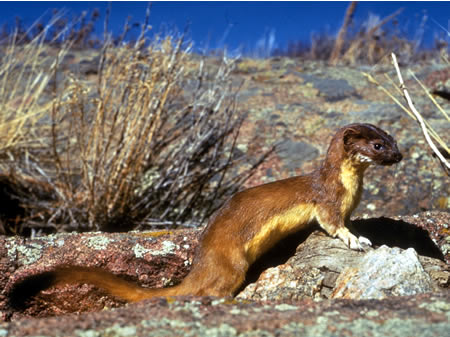|
| 질의: Mammal | 결과: 2387번째/3464 | |
Long-tailed Weasel (Mustela frenata) - Wiki
| 제목: | Long-tailed Weasel (Mustela frenata) - Wiki
| |

| 해상도: 450x337
파일크기: 47431 Bytes
등록시간: 2007:01:09 22:48:32
|
ERROR : Server Busy(-1105)
ERROR : Server Busy(-1105)
Long-tailed Weasel (Mustela frenata) - Wiki
Long-tailed Weasel
From Wikipedia, the free encyclopedia
[Photo] North American Longtail Weasel. A long-tailed weasel (Mustela frenata ) hunts on the tundra. From U.S. National Park Service .
The Long-tailed Weasel (Mustela frenata) is the most widely distributed mustelid in the New World. Its range extends from southern Canada through most of the United States to Mexico, Central America and the northern parts of South America. It is generally found in open or semi-open habitats near water.
This is a typical weasel with a long slender body, short legs and a bushy tail that is almost as long as the rest of the animal. Adult males measure from 33 to 45 cm (including their tails), and may weigh up to 450g; females are typically about 15% smaller. They are gingerish-brown in colour, with yellowish-white belly fur, but in the northern parts of their range they moult to pure white in winter. The tip of the tail is black in all seasons.
Like most weasels, Long-tailed Weasels mainly eat rodents, their slender bodies enabling them to pursue their prey into their burrows. They are most active at night but are sometimes seen during the day. They are highly solitary, and their home ranges do not overlap with another member of the species of the same sex (though each male's home range may include several females' home ranges). They young are born helpless, but by 56 days are able to catch prey independently.
They are able to climb trees and are also good swimmers.
http://en.wikipedia.org/wiki/Long-tailed_Weasel
| The text in this page is based on the copyrighted Wikipedia article shown in above URL. It is used under the GNU Free Documentation License. You may redistribute it, verbatim or modified, providing that you comply with the terms of the GFDL. |
|
댓글 |
|---|
| | 손님 |
|
Scientific Name: Mustela frenata Lichtenstein, 1831
Common Names:
English – Long-tailed Weasel, Bridled Weasel, Big Stoat
Spanish – Comedreja Andina, Comadreja cola larga
French – belette à longue queue |
^o^
동물그림창고 똑똑전화 누리집
^o^
|
|
|